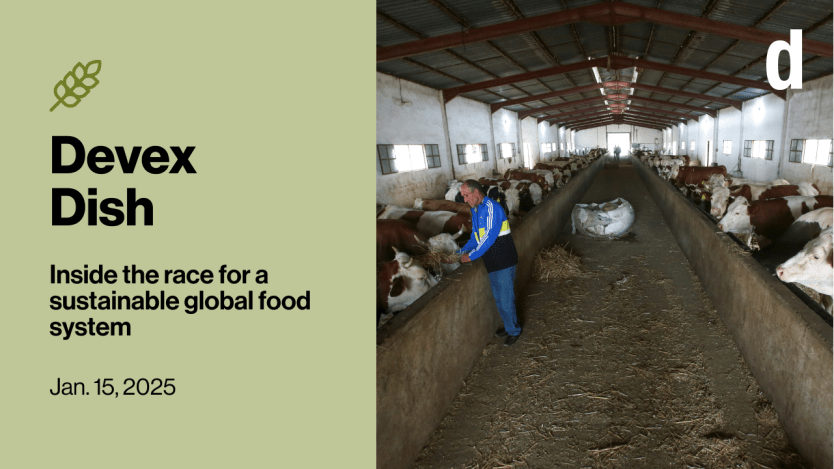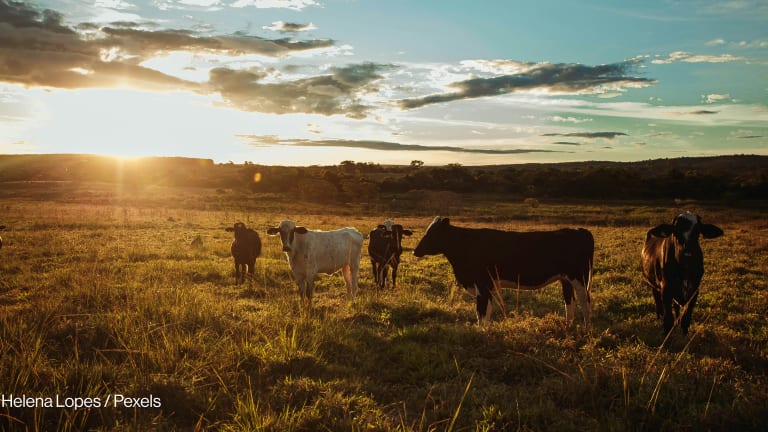
Cows might not seem like climate villains, but their burps pack a punch.
Agriculture accounts for 43% of global methane emissions, making it a critical area for climate action. Cows and other ruminants release methane during digestion — a process known as enteric fermentation (or basically, cow burps) — while rice fields and poor animal feed quality add to the methane problem.
This is a preview of Devex Dish
Sign up to this weekly newsletter to get the inside track on how agriculture, nutrition, sustainability, and more are intersecting to remake the global food system.
The good news? Proven solutions exist to reduce emissions while supporting farmers, and they’re slowly breaking into the mainstream.
Cows in low-income countries emit significantly more methane per liter of milk or pound of meat than their counterparts in wealthier nations. This is due to inefficient farming practices, poor-quality feed, and farmers’ limited access to veterinary care. Closing this productivity gap doesn’t just boost incomes — it also helps cut methane emissions, killing two burps with one stone.
Organizations such as the East Africa-based International Livestock Research Institute work with smallholder farmers to improve livestock feed, breeding practices, and animal health. In East Africa, the International Fund for Agricultural Development’s Dairy Intervention for Mitigation and Adaptation project is helping over half a million farmers adopt climate-smart practices, aiming to cut emissions by 12.6% and increase milk production by 34%.
Multilateral development banks are also stepping in with innovative financing mechanisms to fight methane emissions. For instance, a $350 million World Bank loan to Uruguay includes interest rate incentives tied to methane reduction targets.
As methane emissions rise faster than ever, addressing the problem within the agricultural sector is emerging as a key priority for global climate action in 2025. With the United Nations’ COP30 climate summit in Brazil just months away, countries are under pressure to strengthen their nationally determined contributions, or NDCs, under the Paris Agreement, many of which include targets for cutting methane.
Initiatives focusing on livestock — particularly in low-income regions where small-scale farmers are central to food systems — offer a critical opportunity to achieve both emissions reductions and development goals. Those NDCs are due next month, so we’ll be watching to see how various food systems issues fit in.
This story is the first in a two-part series on how global development organizations are trying to mitigate methane emissions. The next part will examine food loss and waste.
Read: These groups are fighting cow burps to slow methane emissions
See also: What the world can learn from Denmark's carbon tax on agriculture (Pro)
+ Not yet a Devex Pro member? Start your 15-day free trial today to access all our exclusive reporting and analyses, data-driven funding insights, members-only events, the world’s largest global development job board, and more. Check out all the exclusive content available to you.
Recipe for success
African heads of state have adopted a 10-year strategy to transform the continent’s agrifood systems and address the growing food security crisis.
The Kampala Declaration, signed last weekend at an African Union summit in Uganda’s capital, commits to increasing the continent’s agricultural output by 45% by 2035 by adopting sustainable agricultural practices. Other objectives include reducing post-harvest losses by 50%, tripling intra-African trade in agrifood products, and raising the share of locally processed food to 35% of agrifood GDP. It also aims to mobilize $100 billion in public and private investments and ensure 60% of the population can afford a healthy diet.
Compared to its predecessor, the Malabo Declaration, the plan marks a shift from a narrow focus on agricultural sector growth to a food systems approach that emphasizes sustainability, resilience, and inclusivity.
But it also comes on the heels of unmet Malabo Declaration commitments — with no African country on track to meet its 2025 targets under that agreement. A review last year revealed that agricultural spending in all countries remains well below the pledged 10% of public expenditure, while cereal yields lag at less than 25% of their potential.
Supporters of the Kampala Declaration tell me its systems-based approach is a critical evolution, addressing interconnected challenges such as climate change and shifting consumption patterns. But its success will depend on how well countries implement the strategy and whether new mechanisms, such as enhanced governance and public-private partnerships, can bridge gaps in financing and accountability.
Read: African countries adopt new 10-year agriculture strategy
Hey Dish readers, we want to hear from you! What else should we cover in 2025? Let us know by emailing dish@Devex.com
Reach for the moon
More than 150 Nobel laureates and World Food Prize winners have appealed for a food security “moonshot” to tackle the global hunger crisis. In an open letter, they’re urging governments, international organizations, and the private sector to invest in sustainable agriculture, innovative technologies, and equitable food distribution systems. The idea? A coordinated global push to fund the research and innovation that will end hunger — something akin to the ambition of the 1960s space race.
Despite progress in agriculture and food systems, over 700 million people still face chronic hunger — a number that is climbing due to climate change, conflict, and economic inequality. The letter highlights solutions such as increased funding for agricultural research, support for smallholder farmers, and reducing food waste, framing food security as both a moral responsibility and a cornerstone for global peace and stability.
Led by Cary Fowler, the outgoing U.S. special envoy for global food security and a 2024 World Food Prize laureate, the letter highlights promising scientific breakthroughs that could help achieve the “moonshot” goals. These include enhancing photosynthesis in crops like wheat and rice, improving the storage and shelf life of fruits and vegetables, developing indigenous crops resilient to climate change, and creating nutrient-rich foods from microorganisms and fungi.
“From improvements in crop genetics facilitated by artificial intelligence to the development of local-scale nitrogen fertilizer production,” letter signatory Cynthia Rosenzweig, a senior research scientist at the NASA Goddard Institute for Space Studies and the 2022 World Food Prize winner, says in an email to Devex, “we must address the global food demand on multiple ‘moonshot’ fronts.”
Read: 150 Nobel and World Food Prize winners call for food security ‘moonshot’
+ Who’s solving today’s development challenges in new ways? We’re compiling the Devex 50 — a deep dive into the most dynamic organizations, individuals, and initiatives shaping global development’s future. From creative financing approaches to breakthrough climate solutions, which organizations or initiatives are pioneering fresh strategies?
Send your nominations to hayley.mundeva@devex.com and help us spotlight these influencers.
A new dawn for AGRA
Alice Ruhweza has been named the new president of AGRA and will take the reins on March 1, succeeding Agnes Kalibata who has run the organization for the past decade.
Ruhweza, a Ugandan national with extensive experience in sustainable development, joins from the World Wide Fund for Nature (WWF International), where she serves as senior director for policy influence and engagement. Her background in sustainability is likely to get attention, as her appointment comes at a time when there has been mounting criticism from environmental groups about AGRA’s embrace of industrial agriculture.
“For Africa to achieve its goal of sustainable and resilient agri-food systems, the next five years demand urgency, ambition, and decisive action,” Ruhweza says.
Read: AGRA appoints Alice Ruhweza as new president
Tracking what counts
Bringing home the bacon
Your next job?
National Livestock Development Expert
Food and Agriculture Organization
Eritrea
A new report from the Food Systems Countdown Initiative, published in the Nature Food journal, examines global food systems by tracking 50 key indicators across five areas — diets, environment, livelihoods, resilience, and governance.
The good news: Resilience and nutrition have improved, with better access to safe water, more available vegetables, and stronger conservation of genetic resources helping food systems withstand climate shocks. On the downside, food price volatility, declining government accountability, and reduced civil society participation are creating instability and policy challenges. Finally, the report shows how changes in one area, like governance or diet quality, can affect others, with case studies from Ethiopia, Mexico, and the Netherlands offering real-world examples.
“This new report reveals a mix of encouraging advancements and concerning setbacks, underscoring the urgency of accelerating food systems transformation,” said Lawrence Haddad, executive director of the Global Alliance for Improved Nutrition, one of the institutions behind the report. “As this report shows, tradeoffs are inevitable between food system goals such as jobs, climate, nutrition, food security and resilience. But with stronger governance and better data these tradeoffs can be mitigated and even flipped into synergies.”
Chew on this
Indonesia’s new government started a nationwide project to feed nearly 90 million children and pregnant women, a bid to fight malnutrition that is expected to cost $28 billion through 2029. [Time]
U.S. aid leaves out local groups addressing food security in Africa, critics say. [PBS]
China is accelerating the development of high-yield soybean and corn varieties to boost food security. [Reuters]








